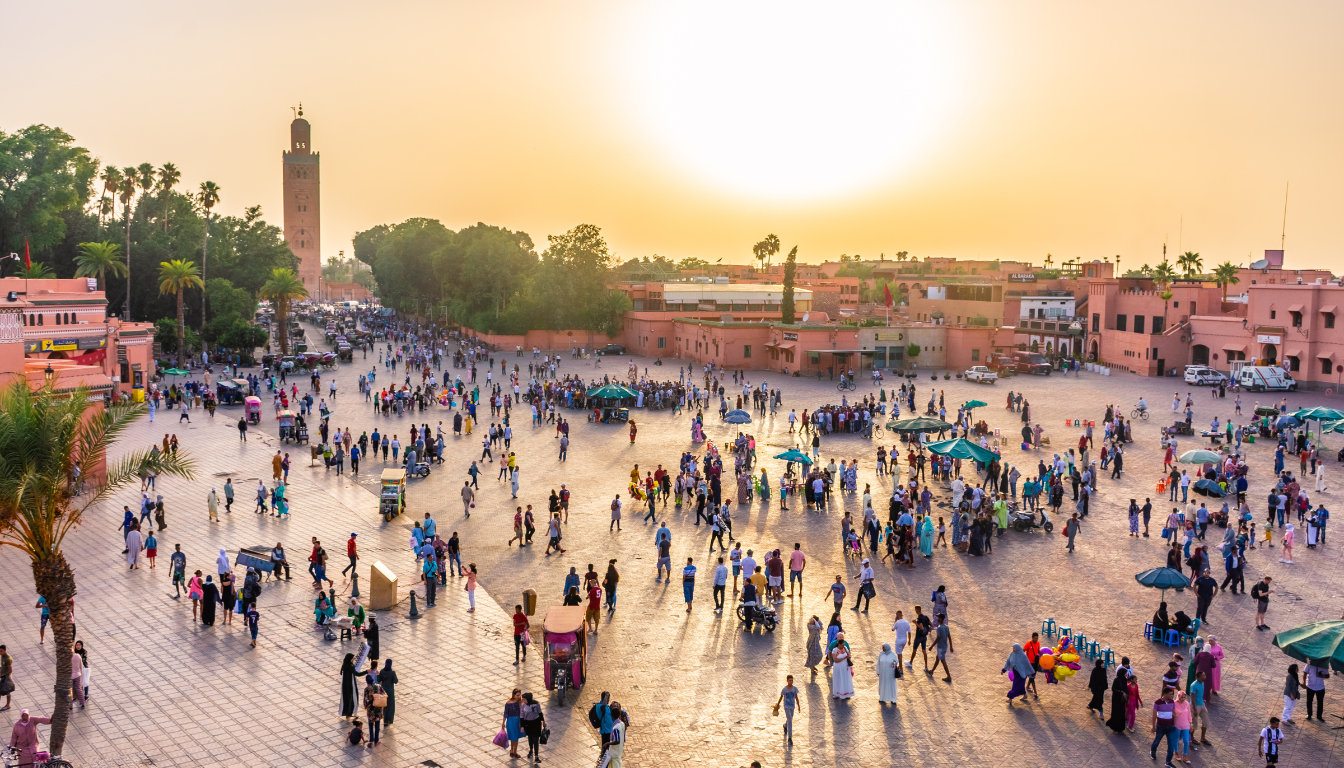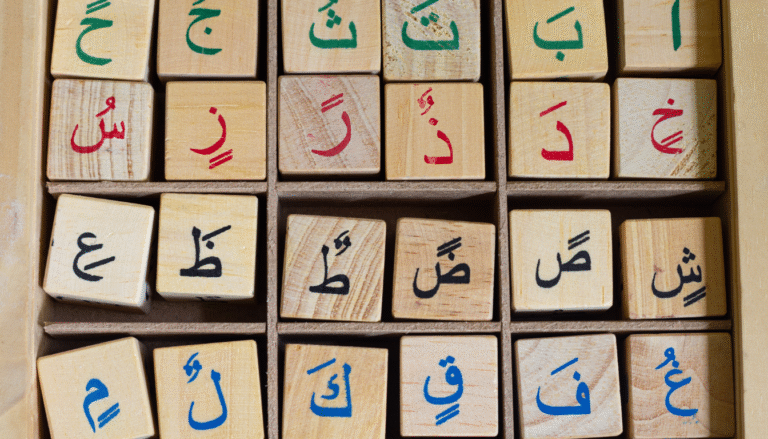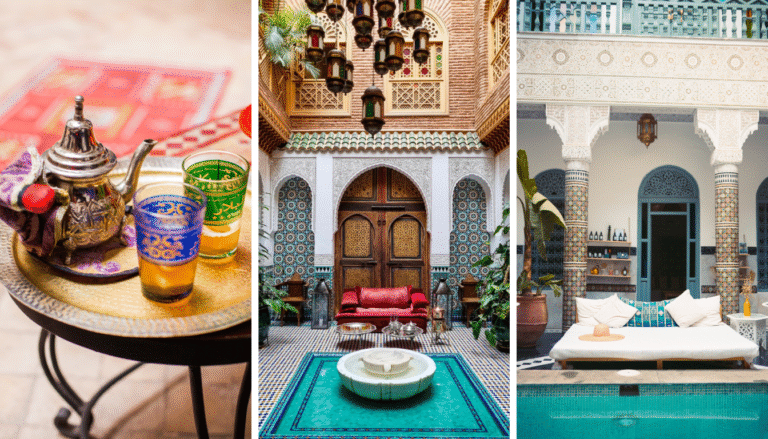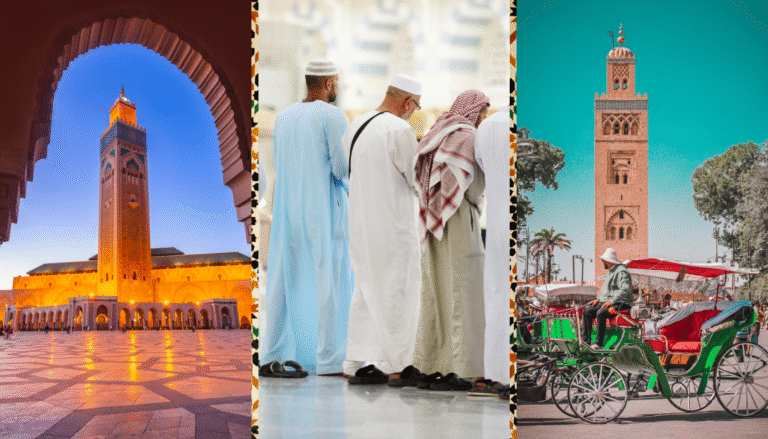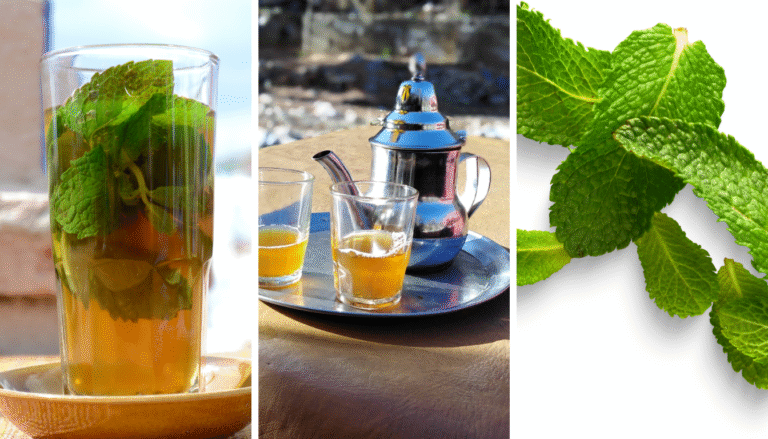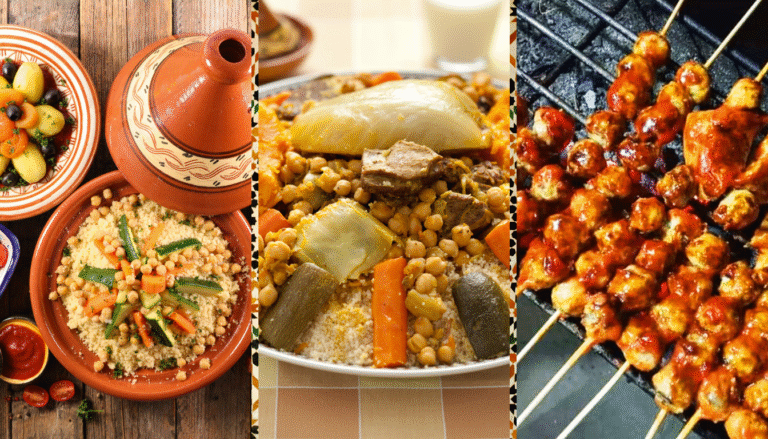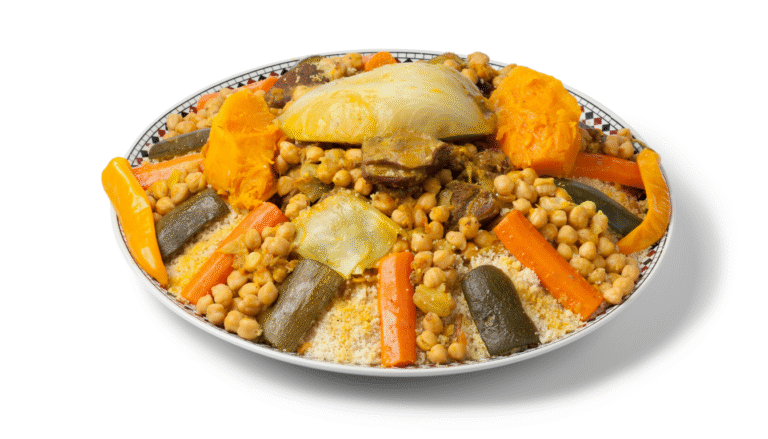Spoken in Morocco. How to Communicate with Locals ?
Did you know Morocco is a mix of cultures and languages? It has a rich history with many influences. Arabic, Amazigh, French, Spanish, and English are all common in Morocco.
When planning your trip to Morocco, knowing the local linguistic diversity is important. It helps you connect with locals and enjoy the culture more. We’ll look at the languages spoken in Morocco and give tips for communicating with the locals.
The Linguistic Landscape of Morocco
Morocco’s language scene is a colorful mix of history and geography. It sits at the meeting point of Africa, Europe, and the Arab world. This makes it a place where many languages and cultures blend together.
A Brief History of Languages in Morocco
The history of languages in Morocco is long and rich. For centuries, the Berber languages were spoken here. Then, in the 7th century, Arabic came with the Arab conquest. It soon became the main language.
Later, French and Spanish rule added European languages to the mix. This created a unique blend of languages in Morocco.
The Impact of Geography on Language Distribution
Geography has shaped Morocco’s language diversity. The Atlas Mountains and the Sahara Desert have helped create isolated areas. Here, unique dialects and languages have developed.
In rural and mountainous areas, Berber dialects are common. But in cities, Moroccan Arabic (Darija) is the language of choice.
Morocco’s language scene is complex. It includes Moroccan Arabic, Berber languages, French, and Spanish. Knowing about this diversity helps us understand Morocco’s rich culture.
Official Languages Spoken in Morocco
Understanding Morocco’s official languages is essential. The country has a rich linguistic landscape. Two official languages are key to its culture and daily life.
Modern Standard Arabic: The Primary Official Language
Modern Standard Arabic is used in formal settings. This includes government, education, and media. It’s the standardized Arabic form used across the Arab world.
In Morocco, it’s used in official contexts. This includes government documents, formal speeches, and schools.
Amazigh (Berber): The Indigenous Official Language
Amazigh, also known as Berber, is Morocco’s indigenous language. It’s spoken by the Amazigh people. It has several dialects and is a big part of Moroccan heritage.
The recognition of Amazigh as an official language is a big step. It helps preserve Morocco’s cultural diversity.
The 2011 Constitutional Recognition of Berber
In 2011, Morocco’s constitution was updated. It recognized Amazigh as an official language, alongside Modern Standard Arabic. This was a big step for the Amazigh community.
It has led to more use of Amazigh in public life. This includes education and media.
Darija: The Moroccan Arabic Dialect
Exploring Morocco, you’ll find Darija is more than a dialect. It’s a doorway to the culture. Darija, the Moroccan Arabic dialect, is widely spoken. It’s used in daily talks among locals.
How Darija Differs from Standard Arabic
Darija is different from Modern Standard Arabic. The latter is used in formal settings, media, and schools. Darija, on the other hand, has its own grammar, words, and way of speaking. It’s shaped by languages like French, Spanish, and Berber.
Regional Variations of Darija
Darija changes from one region to another in Morocco. In cities like Casablanca and Rabat, the dialect is different from rural areas. You’ll notice differences in words, how they’re said, and even grammar.
Common Darija Expressions for Travelers
Knowing a few Darija phrases can make your trip better. Saying “hello” (salam), “thank you” (shukraan), and “how much?” (bekhalas?) helps you connect with people. It also shows respect for their culture.
Berber Languages in Morocco
The Berber languages are a big part of Morocco’s culture. They are spoken by many people. These languages are not just for talking but also show who the Berber communities are.
The Three Main Berber Dialects: Tarifit, Tamazight, and Tashelhit
In Morocco, there are three main Berber dialects: Tarifit, Tamazight, and Tashelhit. Each one is special and spoken in different places.
- Tarifit is mainly spoken in the Rif region in northern Morocco.
- Tamazight is spoken in the Middle Atlas and parts of the High Atlas.
- Tashelhit is widely spoken in the High Atlas and Anti-Atlas regions, as well as in the Souss valley.
Where Each Berber Dialect is Spoken
The places where Berber dialects are spoken relate to the history and culture of each area. Knowing where each dialect is spoken helps travelers understand and enjoy the local cultures.
| Dialect | Region |
|---|---|
| Tarifit | Northern Morocco (Rif region) |
| Tamazight | Middle Atlas, parts of High Atlas |
| Tashelhit | High Atlas, Anti-Atlas, Souss valley |
Basic Berber Phrases for Travelers
Learning a few basic phrases in Berber can make your trip to Morocco better. Here are some key phrases to start with:
- Hello: Azul (AH-zool)
- Thank you: Tanmirt (tahn-MEERT)
- Goodbye: Ar timendeḍ (ar tee-men-DEHD)
By respecting the local languages and cultures, you can have a more meaningful trip in Morocco.
The Role of French in Moroccan Society
In Morocco, French is more than just a foreign language. It’s a big part of daily life, mainly in formal and educational settings. The French colonial rule has left a lasting mark on Morocco’s language scene.
French in Business and Education
French is key in business, government, and schools. Many official papers, business talks, and school lessons are in French. It’s vital for anyone wanting to get into the Moroccan economy or study further.
When and Where to Use French in Morocco
In cities like Casablanca and Rabat, French is widely spoken. Tourist spots also see a lot of French speakers. But, outside these places, French use can drop.
French Colonial Influence on Language
The French colonial past has deeply shaped Morocco’s languages. French was forced into administration and education back then. This legacy continues to influence Morocco’s language today.
Knowing how French fits into Morocco can really improve your visit, business, or studies. It’s a big part of the country’s culture and language.
Other Foreign Languages in Morocco
Exploring Morocco reveals a world beyond Arabic and Berber. The country’s location and cultural history show in its foreign languages.
Spanish Influence in Northern Morocco
In northern Morocco, Spanish is common. This is thanks to Morocco’s past with Spain. Places like Tetouan and Tangier show Spanish culture’s lasting impact.
English and Other Languages in Tourist Areas
In tourist spots, English is widely spoken. It helps locals and visitors communicate. Hotel staff and tour guides often speak English well.
Language Trends Among Younger Moroccans
Younger Moroccans are keen on learning English and French. They want to join the global community and find better jobs and education.

Morocco’s many languages show its rich culture and role as a crossroads. Talking to locals lets you see the beauty of its multilingual world.
Language Spoken in Morocco: Urban vs. Rural Areas
Traveling through Morocco, you’ll see a world of languages. The city and countryside have different ways of speaking. This is because of the country’s history, geography, and culture.
Differences Between Major Cities
In big cities like Marrakech, Rabat, and Casablanca, you’ll hear many languages. You’ll often find Modern Standard Arabic, Darija (Moroccan Arabic), and French. These languages are key in business, schools, and government.
Communication in Remote Villages
But in remote villages, it’s different. Places like the Rif Mountains have people speaking Tarifit, a Berber dialect. In the Atlas Mountains, Tamazight and Tashelhit are common. These areas stick to their local languages, which are important for everyday talk.
Language Adaptation for Different Regions
Knowing the local languages can make your trip better. Learning about the main languages and dialects in each area helps you get around and respect local customs.
| Region | Predominant Languages/Dialects |
|---|---|
| Urban Areas (Marrakech, Rabat, Casablanca) | Modern Standard Arabic, Darija, French |
| Rif Mountains | Tarifit (Berber dialect) |
| Atlas Mountains | Tamazight, Tashelhit (Berber dialects) |
Essential Phrases for Travelers in Morocco
To really get into the Moroccan vibe, learning key phrases is key. Morocco is a place where Darija (Moroccan Arabic) and Berber languages are big. Knowing a few important phrases can make your trip better.
Greetings and Basic Courtesies
It’s important to greet locals with respect. In Darija, say “As-salamu alaykum” (peace be upon you) as a hello. The reply is “Wa alaykum as-salam” (and upon you be peace). This shows you care.
Other nice things to say include “Shukran” (thank you) and “Afwan” (you’re welcome). They’re simple but show you respect the culture.
Shopping and Bargaining Phrases
Bargaining is common when shopping in Morocco. Start by asking, “Bshahal hadشي?” (how much is this?). To negotiate, say “Tekhdem bessa3r?” (can you do it cheaper?).
For example, a vendor might say,
“The price is 100 dirhams, but for you, I can do 80.”
You could then say, “I’ll give you 60 dirhams, and that’s my final offer.”
Restaurant and Food-Related Vocabulary
Knowing some food words can be helpful when eating out. “Water” is “Ma” in Darija, and “Bread” is “Khobz.” If you’re looking for a place to eat, ask, “Fein kayn restaurant?” (where is a restaurant?).
Transportation and Direction Terms
Understanding how to get around is important. You can ask for directions by saying “Fein…?” (where is…?). For example, “Fein kayn al-mahatta?” means “Where is the train station?”
Useful terms include “Shmal” (north), “Janoub” (south), “Sharq” (east), and “Gharb” (west). Knowing these can help you move around better.
Navigating Language Barriers in Morocco
Morocco’s many languages can be confusing, but you can communicate well with the right tools. You’ll find everything from Modern Standard Arabic to French and Berber dialects. There are smart ways to deal with language barriers.
Using Translation Apps and Resources
Translation apps are a great way to bridge language gaps. Google Translate lets you translate text, speech, and live conversations. It’s also good to have a phrasebook or pocket dictionary for places without internet.
Non-Verbal Communication Tips
Non-verbal cues are key in Morocco. Smile, use gestures, and be polite. Learning basic hand gestures and body language is helpful. Remember, using your right hand is polite when giving or receiving.
Finding English-Speaking Assistance
In tourist spots, many locals, like the young and service workers, speak English. Tour guides, hotel staff, and tourist info centers can also help. Moroccans love to practice English, so don’t be shy to ask for help. Here’s how to find English speakers:
- Visit tourist information centers for guidance.
- Ask hotel staff for recommendations or assistance.
- Hire a local guide for tours.
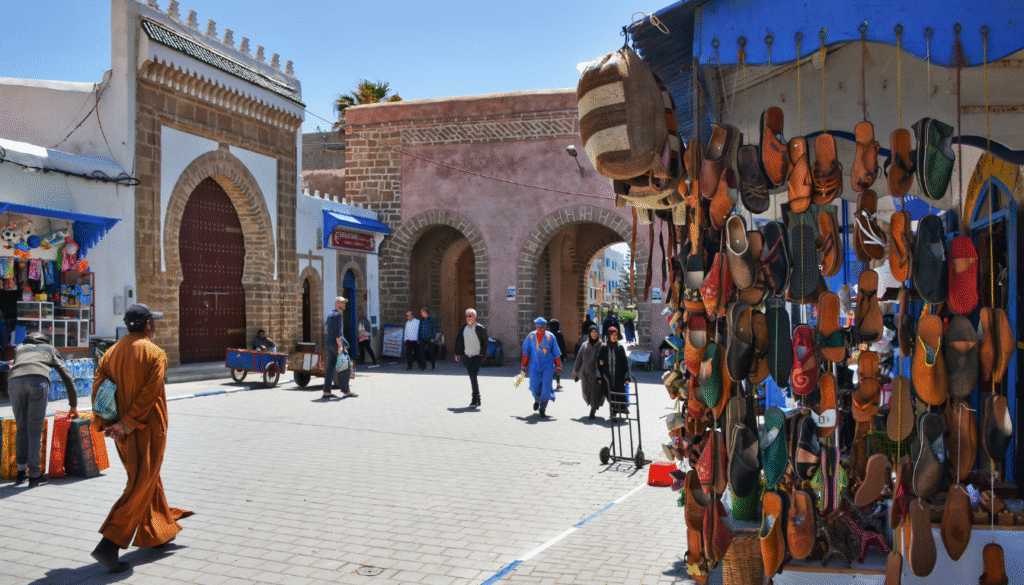
Language Etiquette and Social Contexts
Morocco’s diverse languages need visitors to be careful with language rules in different places. Knowing the language’s subtleties can really help you connect with locals.
Choosing the Right Language for Different Situations
In Morocco, the right language changes with the situation. For official events or talking to officials, Modern Standard Arabic is best. But, in everyday talks, Darija (Moroccan Arabic) is more common, mainly in cities.
Language as a Reflection of Social Status
In Morocco, speaking certain languages shows your social standing. Knowing French means you’re likely well-educated and from a higher class. This knowledge helps you fit in better in different social settings.
Respecting Multilingual Environments
Morocco values its many languages, and it’s important to respect this. Always think about the setting and the languages being used. Saying a few words in the local tongue shows you care.
| Language | Context | Tips |
|---|---|---|
| Modern Standard Arabic | Formal events, official interactions | Use formal greetings and titles |
| Darija (Moroccan Arabic) | Casual conversations, urban areas | Learn basic phrases like “hello” (salam) and “thank you” (shukraan) |
| French | Business, education, tourism | Use French for formal documents and professional interactions |
Cultural Considerations When Communicating in Morocco
Effective communication in Morocco is more than just speaking the language. It’s about understanding the local culture. As you explore the vibrant streets and markets, knowing cultural nuances can make your interactions better.
Respect and Politeness in Moroccan Culture
Moroccans value respect and politeness a lot. Always use formal titles and last names until you’re told to use first names. Also, use your right hand when giving or receiving something, as the left hand is seen as unclean.
Topics to Avoid in Conversation
Some topics are best avoided in Morocco. Politics, religion, and the Western Sahara conflict are sensitive subjects. “The key to successful interactions is to be respectful and considerate of local customs.”
Language and Moroccan Identity
Language is a big part of Moroccan identity. Arabic, Amazigh (Berber), and French show the country’s rich diversity. Knowing the importance of these languages helps you connect with locals.
The Role of Language in Religious Contexts
In Morocco, language is key in religious settings. Classical Arabic is used in prayers and texts, while Modern Standard Arabic is used in discussions and sermons. Showing respect in these contexts can make your experience richer.
When talking to Moroccans, remember that cultural sensitivity and awareness are as important as speaking the language. Being mindful of these cultural aspects can help you make deeper connections and enjoy your time in Morocco more.
Conclusion
Understanding the language spoken in Morocco is key to unlocking its rich culture. Morocco’s mix of languages shows its complex history, geography, and culture.
Exploring Morocco’s languages and dialects reveals a unique blend. Arabic, Berber, French, and others mix together. This diversity enriches culture and aids in communication and exchange.
By embracing Morocco’s language diversity, you can better enjoy your time there. Whether traveling, working, or just interested in Moroccan culture, knowing the language is vital. It helps you navigate and connect with the local culture.

